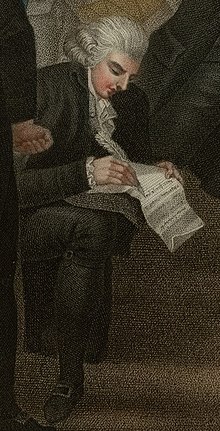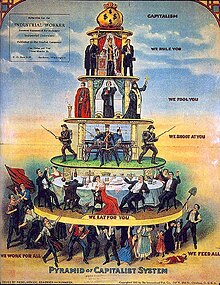Jacques Roux
Appearance

Jacques Roux (21 August 1752 – 10 February 1794) was a radical Roman Catholic priest who took an active role in politics during the French Revolution and represented the Enragés, a faction to the left of the Jacobins. A supporter of the revolution of 1793, Roux was a member of the Jacobins retaining a personal friendship with Jean-Paul Marat. Roux's most famous work Manifesto de les Enragés is considered by many to be an example of proto-socialist thought.
Quotes
[edit]

- The great art of the legislator consists, not in proposing many laws, but in rendering their execution easy; not in reigning over men by terror, but in rendering himself master through wisdom and the mildness of government; not in establishing inquisitorial commissions in order to find the greatest number of guilty, but in principally striking the chief conspirators and being indulgent towards weak and repentant citizens who have gone astray.
If a people is in a state of revolution or not, its principles are those of eternal reason, of eternal justice. As Robespierre observed: Tyranny cannot save the state and freedom. When laws are made retroactive, when we multiply without any need violent measures, we announce ourselves to be ignorant or cruel. Fear only engenders slaves; humanity alone makes the conquest of liberty, and only crime should be punished on earth.- "On the Decree Relating to the Arrest of Suspects" (1793)
- Ah! This movement of force and energy, this love of happiness, this plan of courage amid the insane who surround us attests to the strength of reason, which has imperceptibly advanced across the centuries. So many sublime outbursts of patriotism on the part of the French prove that servitude is an outrage to the dignity of human nature, and that there is no nation on earth that can return them to their former slavery.
- "On the Majesty of the French People" (August 12, 1793)
- If corrupted representatives, faithless administrators, prevaricating agents hadn’t been able to form from one pole to the other a chain of conspirators to fool the people, lull them at the edge of the abyss and complete their ruin; if infamous deserters from the public thing, rebellious children, hadn’t been able to pierce the breast of the motherland and halt liberty in its triumphant march; if the scoundrel faction that dominated the three legislatures hadn’t called down on France the plagues of war and famine; if they hadn’t delivered our forts and our patriotic phalanxes to the steel of executioners, the laws of humanity would be recognized everywhere, liberty would have conquered the world, and there wouldn’t exist a single throne on earth.
- "On the Majesty of the French People" (August 12, 1793)
- When France fought under kings and for kings it was intrepid and great; today when it fights for the people, for freedom, for the triumph of laws of its making; today, when it only takes out its sword at the call of justice, it must only sheath it at the song of victory, let us carry the pride of Spartans and the courage of Brutus as a tribute to the fatherland. Let our weapons be, not the honor that allied itself to crime, as among the nobles, but the love of equality and the hatred of tyrants. He who dies for the liberty of his country, lives eternally in glory. There is no destiny as glorious as that of crushing despotism, that of smashing, pulverizing, and annihilating those illustrious brigands, those decorated cowards who want to master us with so much pride and cruelty.
- "On the Majesty of the French People" (August 12, 1793)
Manifesto of the Enragés (1793)
[edit]
- Freedom is nothing but a vain phantom when one class of men can starve another with impunity. Equality is nothing but a vain phantom when the rich, through monopoly, exercise the right of life or death over their like. The republic is nothing but a vain phantom when the counter-revolution can operate every day through the price of commodities, which three quarters of all citizens cannot afford without shedding tears.
- For the last four years the rich alone have profited from the advantages of the Revolution. The merchant aristocracy, more terrible than that of the noble and sacerdotal aristocracy, has made a cruel game of invading individual fortunes and the treasury of the republic; we still don’t know what will be the term of their exactions, for the price of merchandise rises in a frightful manner, from morning to evening. Citizen Representatives, it is time that the combat unto death that the egoist carries out against the hardest working class of society come to an end. Pronounce against speculators and monopolists: either they’ll obey your decrees or they won’t. In the first hypothesis you will have saved the fatherland; in the second case you will still have saved the fatherland, for we will have been able to identify and strike the bloodsuckers of the people.
- The freedom of commerce is the right to use and to make use of, and not the right to tyrannize and prevent use. Those goods necessary to all should be delivered at a price accessible to all. Pronounce then...the sans-culottes with their pikes will execute your decrees ...
- Up to the present moment the big merchants who are, by principle criminals and by habit accomplices of kings, have abused the freedom of commerce to oppress the people; they have falsely interpreted that article of the Declaration of the Rights of Man that establishes that it is permitted to do all that is not forbidden by the law. Well then, decree constitutionally that speculation, the sale of minted money, and monopolies are harmful to society. The people, who know their true friends, the people who have suffered for such a long time, will see that you are sorrowed by their lot and that you seriously want to cure their ills. When it will have a clear and precise law in the constitutional act against speculation and monopolies it will see that the cause of the poor is closer to your hearts than that of the rich; it will see that there don’t sit among you bankers, arms merchants and monopolists; finally, it will see that you don’t want the counter-revolution.
- Deputies of the Mountain: No! No! You will not leave your work in a state of imperfection. You will found the bases for public prosperity; you will not consecrate the general and repressive principles of speculation and monopoly; you will not give to your successors the terrible example of the barbarism of powerful men over the weak, of the rich over the poor. You will not end your career in infamy.

